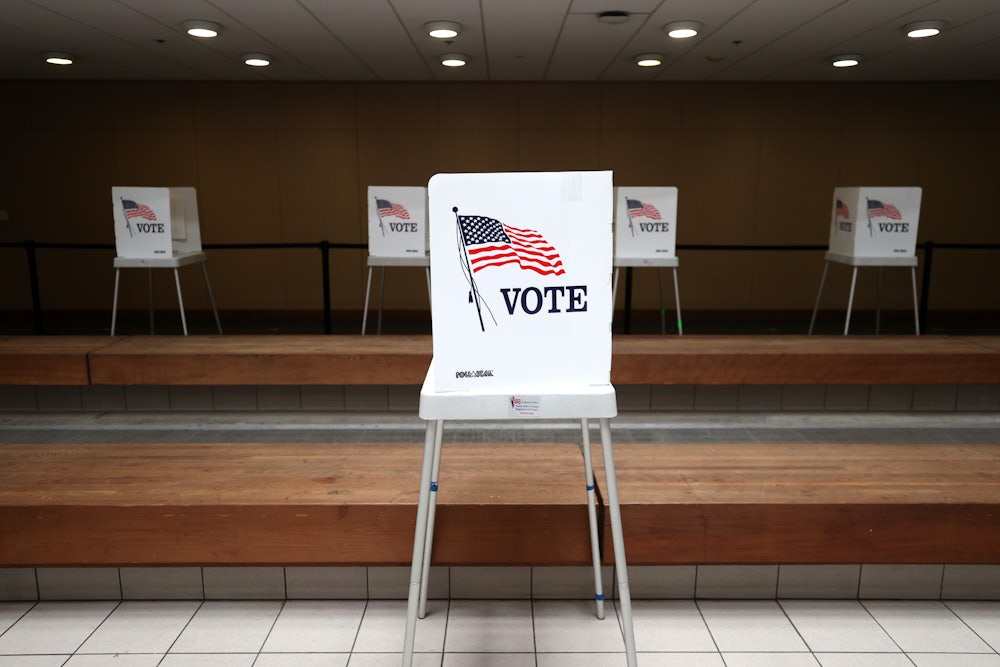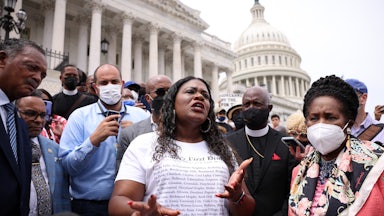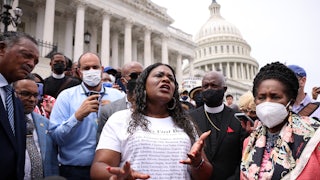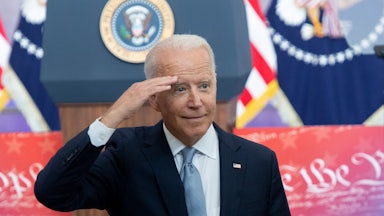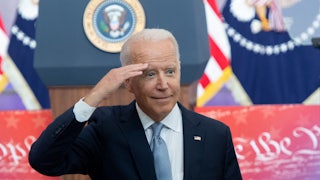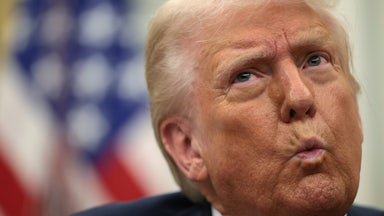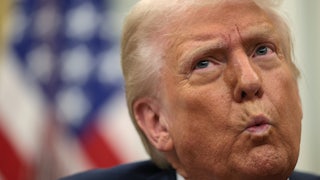It would be fair to say that the eyes of the nation are not currently focused on the uphill battle to advance voting rights legislation in Congress. Images of the fall of Kabul to the Taliban, after 20 years of seemingly fruitless American engagement in Afghanistan, dominated screens over the weekend, leading President Joe Biden to hastily return to Washington on Monday to deliver remarks.
Members of Congress have also trained their focus on the situation in Afghanistan, with Republicans and even some Democrats critical of the scheduled U.S. troop withdrawal to which Biden has clung, and of the potential failures of intelligence that did not account with anything resembling precision for how quickly the Afghan government could fall to the Taliban. With Congress in recess, the members who have contributed their stinging statements to the cause are largely doing so from their home districts. The House is not set to return to Washington until August 23, and foreign policy is not expected to be the main focus of that week’s action.
Despite the swirling morass of competing priorities vying for congressional attention, a virtual hearing of a House Judiciary subcommittee on Monday morning remained stubbornly focused on voting rights, which Democrats insist is a priority despite its unlikely chance of success in the Senate.
Monday’s hearing focused on potential legislative reforms to the Voting Rights Act of 1965, a portion of which was gutted by the Supreme Court in its 2013 decision Shelby County v. Holder. Speaker Nancy Pelosi pledged in a letter to colleagues on Sunday that, along with considering a massive budget resolution containing Democratic policy priorities and a bipartisan infrastructure bill—both of which were passed in the Senate last week—the House would take up the John Lewis Voting Rights Act, or H.R. 4, saying that “we anticipate passing this vital bill when we return.”
The measure, named for the late congressman and civil rights icon, would essentially restore Section 5 of the Voting Rights Act. This provision required jurisdictions with a history of race-based discrimination to receive approval from the federal government before changing their election laws, a practice known as preclearance.
“In the absence of preclearance, states and localities have been implementing measures to further deny or abridge citizens’ right to vote on account of race, color, or language minority status,” said Representative Steve Cohen, the chair of the Subcommittee on the Constitution, Civil Rights, and Civil Liberties, in his opening statement on Monday.
The hearing featured testimony from Assistant Attorney General Kristen Clarke, who argued in her opening statement that “congressional action is necessary to prevent us from backsliding into a nation where millions of citizens, particularly citizens of color, find it difficult to register, to cast their ballot, and to elect candidates of their choice to offices from the presidency to members of their local school board.”
“The department will continue to use its existing tools to enforce the current laws. But that does not change the harsh reality that the Shelby County decision eliminated critical mechanisms for protecting voting rights,” Clarke said. “On behalf of the attorney general, we ask Congress to pass appropriate legislation that will restore and improve the Voting Rights Act, enhancing the department’s ability to protect the right to vote in the twenty-first century and beyond.”
The Voting Rights Act established a formula for determining which areas could be covered by Section 5, but it had not been significantly updated in the decades following its passage. The law was reauthorized in 2006 on an overwhelmingly bipartisan basis, but without any real changes to it.
In Shelby County v. Holder, the court struck down the formula in a 5-4 decision along ideological lines, arguing that it was outdated. Congress had “reenacted a formula based on 40-year-old facts, having no logical relationship to the present day,” Chief Justice John Roberts argued in the majority opinion. “Congress—if it is to divide the States—must identify those jurisdictions to be singled out on a basis that makes sense in light of current conditions. It cannot rely simply on the past.”
Clarke said in her opening testimony that more than 3,000 discriminatory voting changes were blocked between 1965 and 2013 under Section 5, indicating that the provision was being used regularly.
A subcommittee on the House Administration Committee conducted multiple field hearings this year to gather evidence of unjust practices in voting, resulting in a wide-ranging report released in July that argued there were sufficient examples of discrimination to justify reinstating the preclearance provision.
“The evidence demonstrates that the nation has not changed as dramatically as the Court’s majority may have thought. In the eight years since Shelby County was decided, states have taken significant steps toward suppressing the vote,” the report said.
With Section 5 of the Voting Rights Act effectively neutralized, complainants—including the Justice Department—brought several lawsuits under Section 2, which prohibits voting practices that discriminate against minority groups. Section 2 “has proven no substitute for the critical prophylactic protection afforded by Section 5,” according to Clarke’s opening testimony, and was further undercut this year by the Supreme Court decision in Brnovich v. Democratic National Committee. That ruling upheld two restrictive voting laws in Arizona, and placed new limits on the provision that could make it more difficult to challenge state voting laws.
Several Republican-led states have implemented restrictive voting measures in the wake of former President Donald Trump’s electoral loss and his spurious claims of a rigged election. According to the Brennan Center for Justice, at least 18 states this year have enacted laws that restricted voting access, as of mid-July.
Although proponents argue that the bills are enacted to counter voter fraud—a vanishingly small threat to elections—opponents argue that the laws disproportionately target minority and urban voters, who tend to vote Democrat. Many of the bills under consideration or enacted limit absentee voting, which saw an uptick in the 2020 election thanks to the Covid-19 pandemic. Critics also say that the bills are meant to ensure Republican control over the election process. For example, a law recently enacted in Georgia—which was narrowly won by Biden—would give the Republican-controlled state legislature more control over the State Election Board.
But even if the John Lewis Voting Rights Act passes the House, as expected, it is likely to die in the Senate. There the filibuster reigns supreme, and 10 Republicans must agree to advance any bills—an extraordinarily unlikely prospect for passing a measure that would counter the voter suppression efforts that are already underway and led by members of their party in several states. Efforts to pass the For the People Act, a sweeping elections and campaign finance reform bill that aimed to respond to these state laws with fixes such as automatic voter registration and equitable redistricting, fizzled in the Senate.
The For the People Act had and continues to have no Republican support, and Democratic Senator Joe Manchin, a moderate who often finds himself the key vote in certain ideological fights, has expressed reservations about its scope. In contrast, H.R. 4 has the support of exactly one Republican senator, Lisa Murkowski—nine short of the 10 needed to break a filibuster. Despite pressure from voting rights groups, Democrats are unlikely to eliminate the filibuster, given opposition from Manchin and Senator Kyrsten Sinema. Biden, too, has stopped short of calling for ending the practice, even as he has insisted that shoring up voting rights is a priority for his administration.
Few, if any, Republicans are expected to join Murkowski in supporting H.R. 4. Manchin earlier this year raised the prospect of applying preclearance to all 50 states, arguing that this idea could get bipartisan support, but Republicans have signaled that they think a bill affecting how states run elections would amount to federal overreach. Senate Minority Leader Mitch McConnell, whose support or opposition is generally a bellwether for a bill’s chance of passing, has called the legislation “unnecessary.” During the hearing on Monday, subcommittee ranking member Representative Mike Johnson said that “we should applaud the court’s decision in Shelby County because it acknowledges and recognizes we have come a long, long way from one of the most shameful chapters in this country’s history.”
“Instead of recognizing that progress this country’s made, Democrat colleagues seek to propagate legislation that would amount to an unconstitutional federal power grab over local elections,” Johnson said, demonstrating the contrast between contemporary Republicans and those who voted to renew the Voting Rights Act with large bipartisan majorities in the decades between 1965 and 2013.
To the cynical mind, Monday’s hearing was an exercise in futility; the bill that will in all likelihood pass the House as early as next week is just as likely to fail in the Senate. The fight to shore up voting rights will also, fairly or not, continue to be overshadowed by seemingly more immediate issues, such as the withdrawal from Afghanistan and the ongoing debate over infrastructure legislation. Congress will likely dedicate much of autumn to the sticky yet critically important issues of raising the debt ceiling and funding the government.
All too soon, the country will be embroiled in the midterm elections, and Democrats will have to contend with whether they truly did enough with regards to their self-proclaimed priority of voting rights—or whether hearings such as the one on Monday were a performative effort.
